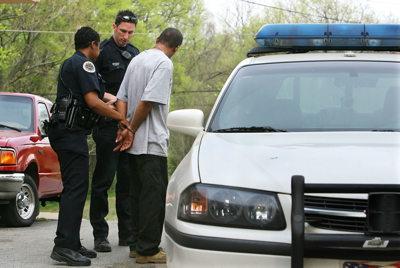The videotaped killings of Alton Sterling in Louisiana and Philando Castile in Minnesota at the hands of police in early July sparked a wave of protests across the country. In Nashville, the local chapter of Black Lives Matter organized a downtown vigil on July 8 that drew 1,800 participants. Earlier in the week, at a nonviolent march in Dallas, a lone gunman ambushed law enforcement officers, killing five of them, wounding 10 others, and injuring two civilians.
Nashville Mayor Megan Barry, in response to the latest tragedies, announced the “Community Dialogue on Racial Justice” — a series of dialogues beginning with a July 23 session at North Nashville’s Pearl-Cohn High School, and concluding with a citywide forum that is expected to draw 1,000 participants on Sept. 10.
If the mayor is resolute about addressing institutional racism in the Metropolitan Nashville Police Department, then the biggest obstacle to reform may be Chief of Police Steve Anderson. Although Anderson has received high marks for MNPD’s civil treatment of protesters at Black Lives Matter rallies, he is lukewarm to institutional fixes that address controversial policing tactics in poor communities of color. These communities, unlike middle-class neighborhoods, experience what social scientists refer to as “secondary marginalization” — acute poverty, stigma, disposability — and pervasive mistreatment by law enforcement.
The biggest disappointment is Anderson’s refusal to overhaul the Operation Safer Streets program that disproportionately targets low-income black and Latino neighborhoods with reputations for gang activities. This is what we know about OSS based on data compiled from MNPD press releases by local members of Black Lives Matter: OSS made 16,000 traffic and face-to-face stops in select neighborhoods from January 2014 to May 2015, and 4,300 similar stops from January to July 2016; 82 percent of these stops did not lead to arrests; the overwhelming majority of the target areas were working-poor black neighborhoods, followed by immigrant and gentrifying communities.
In March 2015, the Justice Department released a report evaluating Ferguson, Mo.’s police department. The report found that practices in the city, similar to those enacted by Nashville’s OSS, institutionalize racial profiling and “contribute to a pattern of unconstitutional policing.” These practices give police departments — in Ferguson and Nashville — the leeway to hand out an excessive number of citations for minor offenses in marginalized communities that are no different than similar transgressions in affluent neighborhoods. In other words, initiatives such as OSS may exist as a revenue-collection program for municipalities that places a regressive, cost-of-living tax on the target communities.
There are other challenges to improving police-community relations in Nashville. MNPD has a poor record of employing blacks and other people of color, as exhibited by the department’s 85 percent white workforce. The city has no civilian review board or police commission with subpoena powers that could independently evaluate police misconduct. By some accounts, the comprehensive anti-bias training program that was initiated several years ago by department personnel has been dormant under Anderson’s watch. Local media reports in October 2015 also revealed the police chief’s opposition to a proposal backed by black lawmakers that intended to give the Tennessee Bureau of Investigation the power to investigate police killings.
Police misconduct is an issue that I know all too well. On the one hand, I have personally witnessed law enforcement officers comforting communities experiencing trauma from street-level gun violence, and then urging residents to seek community-based alternatives to heavy-fisted policing. On the other hand, my cumulative encounters with police while living in various cities have been mostly negative. I know firsthand the frustrations of multiple traffic stops, harassment and acquaintances who were beaten by police. In Nashville my most harrowing experiences took place in late-night encounters with police, two of which occurred at my doorsteps and could have easily turned volatile.
Although I applaud Mayor Barry for jump-starting the community dialogues, it’s clear that using them to implement comprehensive reforms will be a heavy lift. Anderson’s reputation for muscularity and his skill at political stagecraft largely intended to assuage the department’s image among middle-class urbanites make him a potential adversary to meaningful reforms. The Pearl-Cohn dialogue may have already steered the dialogue sessions in the wrong direction. Activists on the front lines of the recent protests were dismayed by the large presence of armed police and unmarked police cars that projected a violent image at the event. Regardless, any serious commitment to reform must seek to overhaul programs such as OSS. It must also link police reforms with broader economic justice policies that expand the opportunity structure for communities experiencing secondary marginalization.
Dr. Sekou Franklin is a professor of political science at Middle Tennessee State University.





